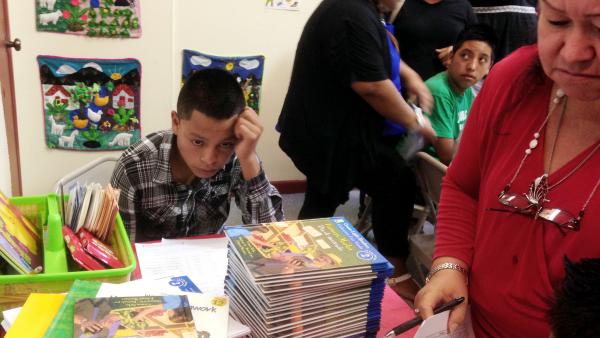Editors note: From time to time we post good comments from our readers. This is another excellent piece by reader ‘pungentpeppers’ with an entirely new and problematic angle on the ‘unaccompanied minors’ crisis that few are aware of! See our category “comments worth noting” for more reader commentary. Our extensive coverage of the ‘unaccompanied minors’ border surge is here.
Certain members of Congress want a law requiring taxpayer-funded legal representation for underage Central American migrants. I’ll ignore for now that there are not enough immigration attorneys, or room in our courts, to handle tens of thousands of long, drawn-out, and often dubious, cases. Instead, let’s focus on the big interpretation wall we’re going to hit because, as usual, nobody remembers the Mayans!

Not everybody in Central America speaks Spanish. This fact is slowly dawning on our politicians. San Francisco’s Mayor Ed Lee in an interview with the San Francisco Bay Guardian said: “I’m trying to wrap my arms around the fact that many of these kids don’t speak Spanish. They speak Mayan and different languages.”
Mayan is not one language but a native language family that includes many mutually unintelligible tongues. About 40 percent of Guatemalans are Mayan, and they speak around two dozen native languages, including M’am, Q’anjob’al, K’itche and Ixil.
Although young people who arrive here could learn basic English, if such a law were enacted, they would still need help to communicate with their lawyers and the courts. They would need legal interpreters. Here’s where it gets messy. For the Guatemalan Mayan language called “Ixil”, there is ONE legal interpreter in the whole country! Her name is Sheba Velasco and she’s been very busy of late. Hers is a mentally-stressful job. People expect her to help them stay in the U.S., but there’s nothing she can do legally for them except interpret the language. There’s so much work, she told NPR, “I can’t do all of it. It’s hard.”
Sheba Velasco has an important message about the unaccompanied minors currently flooding the country. She doesn’t agree with parents sending their children on the dangerous journeys, she told CBC Canada. For starters, their safety is at risk, but second, she’d prefer they stay in Guatemala where they can practice their cultural traditions and language. She knows many families are poor and struggle but Velasco said coming to America is not necessarily how to get a better life.
“What I would like to share with them is, you can make it where you are,” she said.
She feels badly that families fall for the lies they are told by smugglers. The coyotes, as they’re called, show photos of the U.S. around her village, and tell young people how easy it is to make money there. Parents essentially sign their houses over to the banks to get money to pay the smugglers. Their children get caught at the border, are sent home and everything is lost, Velasco explained. In the worst-case scenario, their children don’t even make it back.
“I would not send my children,” she said. “Their life is more important to me.”
The situation of these rural Mayan young people belies the current media gospel that everyone from Central America is fleeing from gangs. They don’t live in cities and they don’t speak Spanish – they can’t even communicate with gangs! As economic migrants, under our laws, there’s no chance they will obtain legal asylum in our country. We should not foolhardily rush into shackling ourselves into providing legal representation, when there are not enough interpreters and their chances of winning such cases are practically nil.
More about Sheba Velasco here:
http://www.cbc.ca/news/world/mayan-translator-hears-sad-stories-from-migrants-at-u-s-border-1.2707816
A story about recently arrived Mayans:
http://wvpublic.org/post/language-barriers-pose-challenges-mayan-migrant-children
The bill in Congress that would mandate legal representation:
http://washington.cbslocal.com/2014/06/24/dems-announce-bill-for-legal-representation-of-illegal-immigrant-children/
About Central Americans and Mayans in the U.S.
http://www.sfbg.com/politics/2014/07/16/more-funding-promised-central-american-child-refugees-lee-warns-new-influx
http://www.guatemalanmaya.org/featured/mayan-languages-our-diverse-culture
